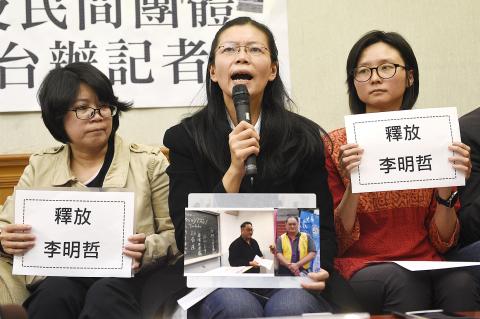Following confirmation yesterday of the detention of Taiwanese human rights advocate Lee Ming-che (李明哲) by Chinese authorities, Lee’s wife and civil rights groups called for his immediate release and condemned Beijing for holding him incommunicado for undisclosed reasons.
China’s Taiwan Affairs Office announced that Lee was being investigated on suspicion of “endangering national security” and was “currently in good physical condition,” which was the first official confirmation of his detention since he arrived in China from Macau on March 19.
Following the announcement, Lee’s wife, Lee Ching-yu (李淨瑜), called on Beijing to immediately release her husband, clarify the charges brought against him and ensure his rights.

Photo: Chen Chih-chu, Taipei Times
Lee Ming-che, a former Democratic Progressive Party (DPP) employee and a long-time advocate of human rights in China, traveled to China to seek medical advice for his mother-in-law and to meet with friends, his wife said.
Lee Ming-che used messaging app WeChat to teach Chinese about public issues and Taiwan-China relations, Lee Ching-yu said, adding that his WeChat account was blocked in summer last year.
He had mailed books that could be considered sensitive by Beijing to friends in China, with one batch — including a book on China’s Cultural Revolution, one on the Sino-Japanese wars and a biography of Mao Zedong (毛澤東) — confiscated by Chinese authorities in August last year, she said.
Over the past several years, Lee Ming-che visited China annually to visit friends he met via WeChat, she said.
“Lee Ming-che has shared Taiwan’s democratic experiences with friends through the Internet. He pays attention to human rights issues and spreads hope to people who need warmth. Those behaviors are not criminal in any civilized country,” Lee Ching-yu said.
“Taiwan has been through the authoritarian White Terror era. We have suffered traumas and pains. The Chinese government should not make Taiwanese relive that history and pain,” she added.
Beijing should have informed Taipei of Lee Ming-che’s detention within 24 hours of his arrest, but it failed to provide such notice until much later and without disclosing his whereabouts or the charges he faces, which are violations of his human rights and related cross-strait agreements, Taiwan Association for Human Rights secretary-general Chiu E-ling (邱伊翎) said.
There has been speculation that Lee Ming-che might have been charged with violating a Chinese law on foreign non-governmental organizations (NGOs), which limits the activities of such groups in China, Democratic Progressive Party Legislator Tsai Yi-yu (蔡易餘) said, adding that would make him the first Taiwanese detained under the law since its passage in April last year.
The law bars NGOs from engaging in human rights issues and judicial reform, Judicial Reform Foundation executive director Kao Jung-chih (高榮志) said, adding that activities considered normal in other nations could constitute crimes in China.
“His detention might be used to warn NGOs,” Kao said, adding that there are concerns that Chinese authorities might torture Lee Ming-che to extract a forced confession.
The human rights advocates called on Beijing to immediately release Lee Ming-che and observe cross-strait agreements that ensure the rights of detainees.

Alain Robert, known as the "French Spider-Man," praised Alex Honnold as exceptionally well-prepared after the US climber completed a free solo ascent of Taipei 101 yesterday. Robert said Honnold's ascent of the 508m-tall skyscraper in just more than one-and-a-half hours without using safety ropes or equipment was a remarkable achievement. "This is my life," he said in an interview conducted in French, adding that he liked the feeling of being "on the edge of danger." The 63-year-old Frenchman climbed Taipei 101 using ropes in December 2004, taking about four hours to reach the top. On a one-to-10 scale of difficulty, Robert said Taipei 101

Nipah virus infection is to be officially listed as a category 5 notifiable infectious disease in Taiwan in March, while clinical treatment guidelines are being formulated, the Centers for Disease Control (CDC) said yesterday. With Nipah infections being reported in other countries and considering its relatively high fatality rate, the centers on Jan. 16 announced that it would be listed as a notifiable infectious disease to bolster the nation’s systematic early warning system and increase public awareness, the CDC said. Bangladesh reported four fatal cases last year in separate districts, with three linked to raw date palm sap consumption, CDC Epidemic Intelligence

US climber Alex Honnold left Taiwan this morning a day after completing a free-solo ascent of Taipei 101, a feat that drew cheers from onlookers and gained widespread international attention. Honnold yesterday scaled the 101-story skyscraper without a rope or safety harness. The climb — the highest urban free-solo ascent ever attempted — took just more than 90 minutes and was streamed live on Netflix. It was covered by major international news outlets including CNN, the New York Times, the Guardian and the Wall Street Journal. As Honnold prepared to leave Taiwan today, he attracted a crowd when he and his wife, Sanni,

Taiwanese and US defense groups are collaborating to introduce deployable, semi-autonomous manufacturing systems for drones and components in a boost to the nation’s supply chain resilience. Taiwan’s G-Tech Optroelectronics Corp subsidiary GTOC and the US’ Aerkomm Inc on Friday announced an agreement with fellow US-based Firestorm Lab to adopt the latter’s xCell, a technology featuring 3D printers fitted in 6.1m container units. The systems enable aerial platforms and parts to be produced in high volumes from dispersed nodes capable of rapid redeployment, to minimize the risk of enemy strikes and to meet field requirements, they said. Firestorm chief technology officer Ian Muceus said